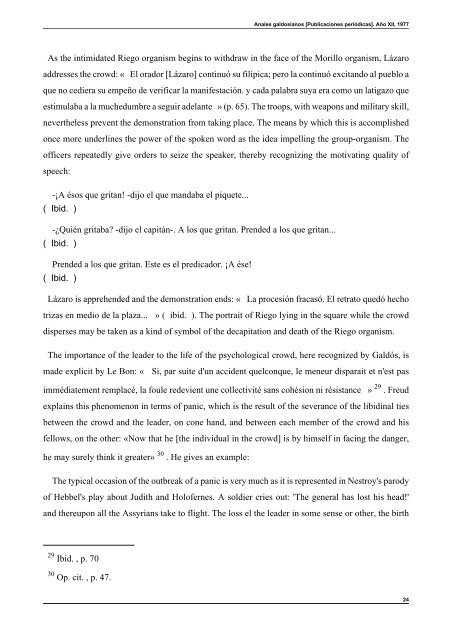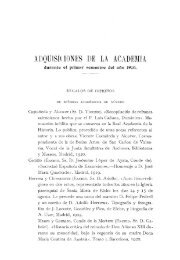Create successful ePaper yourself
Turn your PDF publications into a flip-book with our unique Google optimized e-Paper software.
Anales galdosianos [Publicaciones periódicas]. Año XII, 1977<br />
As the intimidated Riego organism begins to withdraw in the face of the Morillo organism, Lázaro<br />
addresses the crowd: « El orador [Lázaro] continuó su filípica; pero la continuó excitando al pueblo a<br />
que no cediera su empeño de verificar la manifestación. y cada palabra suya era como un latigazo que<br />
estimulaba a la muchedumbre a seguir adelante » (p. 65). The troops, with weapons and military skill,<br />
nevertheless prevent the demonstration from taking place. The means by which this is accomplished<br />
once more underlines the power of the spoken word as the idea impelling the group-organism. The<br />
officers repeatedly give orders to seize the speaker, thereby recognizing the motivating quality of<br />
speech:<br />
-¡A ésos que gritan! -dijo el que mandaba el piquete...<br />
( Ibid. )<br />
-¿Quién gritaba? -dijo el capitán-. A los que gritan. Prended a los que gritan...<br />
( Ibid. )<br />
Prended a los que gritan. Este es el predicador. ¡A ése!<br />
( Ibid. )<br />
Lázaro is apprehended and the demonstration ends: « La procesión fracasó. El retrato quedó hecho<br />
trizas en medio de la plaza... » ( ibid. ). The portrait of Riego lying in the square while the crowd<br />
disperses may be taken as a kind of symbol of the decapitation and death of the Riego organism.<br />
The importance of the leader to the life of the psychological crowd, here recognized by <strong>Galdós</strong>, is<br />
made explicit by Le Bon: « Si, par suite d'un accident quelconque, le meneur disparait et n'est pas<br />
immédiatement remplacé, la foule redevient une collectivité sans cohésion ni résistance » 29 . Freud<br />
explains this phenomenon in terms of panic, which is the result of the severance of the libidinal ties<br />
between the crowd and the leader, on cone hand, and between each member of the crowd and his<br />
fellows, on the other: «Now that he [the individual in the crowd] is by himself in facing the danger,<br />
he may surely think it greater» 30 . He gives an example:<br />
The typical occasion of the outbreak of a panic is very much as it is represented in Nestroy's parody<br />
of Hebbel's play about Judith and Holofernes. A soldier cries out: 'The general has lost his head!'<br />
and thereupon all the Assyrians take to flight. The loss el the leader in some sense or other, the birth<br />
29 Ibid. , p. 70<br />
30 Op. cit. , p. 47.<br />
24

















